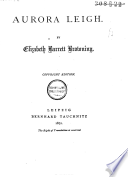Elizabeth Barrett Browning was an English poet of the Victorian era, popular in Britain and the United States during her lifetime.
Born in County Durham, the eldest of 12 children, Elizabeth Barrett wrote poetry from the age of eleven. Her mother's collection of her poems forms one of the largest extant collections of juvenilia by any English writer. At 15 she became ill, suffering intense head and spinal pain for the rest of her life. Later in life she also developed lung problems, possibly tuberculosis. She took laudanum for the pain from an early age, which is likely to have contributed to her frail health.
In the 1840s Elizabeth was introduced to literary society through her cousin, John Kenyon. Her first adult collection of poems was published in 1838 and she wrote prolifically between 1841 and 1844, producing poetry, translation and prose. She campaigned for the abolition of slavery and her work helped influence reform in the child labour legislation. Her prolific output made her a rival to Tennyson as a candidate for poet laureate on the death of Wordsworth.
Elizabeth's volume Poems brought her great success, attracting the admiration of the writer Robert Browning. Their correspondence, courtship and marriage were carried out in secret, for fear of her father's disapproval. Following the wedding she was indeed disinherited by her father. The couple moved to Italy in 1846, where she would live for the rest of her life. They had one son, Robert Wiedeman Barrett Browning, whom they called Pen. She died in Florence in 1861. A collection of her last poems was published by her husband shortly after her death.
Elizabeth's work had a major influence on prominent writers of the day, including the American poets Edgar Allan Poe and Emily Dickinson. She is remembered for such poems as "How Do I Love Thee?" and Aurora Leigh .
Wikipedia
✵
6. March 1806 – 29. June 1861
•
Other names
Elizabeth Barret Browningová,
ಎಲಿಜಬೆತ್ ಬ್ಯಾರೆಟ್ ಬ್ರೌನಿಂಗ್


